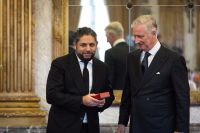Two million UK citizens working abroad could become illegal immigrants overnight if Britain were to leave the European Union, former attorney general Dominic Grieve has warned.
In a hard-hitting attack on Eurosceptics inside and outside the Conservative party, Grieve condemned those who want to tear up the UK’s international treaty obligations and withdraw from both the EU and the European Court of Human Rights.
His comments come ahead of next month’s launch of the Tory election manifesto, which is expected to commit the party to leaving the jurisdiction of the Strasbourg court – although a long-promised draft bill has yet to be published.
There seems to be growing irritation towards how international obligations operate
Those close to the policy of quitting the ECHR insist it will be put to the electorate; other Conservative sources suggest Downing Street may be cooling on the proposal at a time when European unity is threatened – not least by Russian activity in Ukraine and on the fringes of Eastern Europe.
Conservative party policy is, unequivocally, to promise an in-out referendum on the UK’s membership of the European Union. Delivering a lecture in central London entitled ‘Britain’s International Obligations – Fetters or Keys?’, Grieve warned departing from the EU would cause more problems than it solves.
“The requirements of any free trade agreement would make British removal from the clauses dealing with freedom of movement impossible,” he explained, “with the curious consequence that the single biggest cause of domestic irritation with the EU, immigration, would remain unaltered. But without its maintenance some 2 million UK citizens working in EU countries would find themselves becoming illegal immigrants overnight.”
Grieve, who was sacked in the last cabinet reshuffle after vocally opposing Conservative demands to withdraw from the ECHR, has now widened his attack to warn about the dangers of retreat to a policy of “isolationism”. Participation in Nato was in danger of being undermined by Ukip’s campaigns, he added.
While acknowledging the shortcomings of Brussels bureaucracy, Grieve, a QC and the Conservative MP for Beaconsfield, said: “We may now be in an age where the merit of international obligations and membership of treaty organisations more generally is questioned. The UN charter and organisation itself has long been criticised.
“But there seems to be growing irritation towards how international obligations operate. They are seen as fetters on our freedom of action and finances, but doing little to moderate the behaviour of irresponsible states or to assist our wellbeing as a nation.”
The dispute over UK membership ”marks a potentially revolutionary turning point in a previously consistent national approach of building, observing and working within international obligations”, he said.
“There is ... a total lack of clarity as to how a government would proceed to unravel a relationship that has developed in complexity over more than 40 years. Which parts of the several thousand pieces of EU legislation that are currently incorporated into our own statute law would be retained?”
Conservative policy on the European convention on human rights “pays no regard whatsoever to its impact on the other signatory states”, Grieve said. “The success of the convention, despite all its shortcomings, in raising standards of behaviour and promoting human rights globally, and with it the overall security of the Europe, is to be disregarded for the sake of addressing irritations about some of its current domestic impacts which at best will be of utterly marginal benefit.
“... In seeking to abandon the EU and the ECHR what message is conveyed as to the value that the UK attaches to international engagement...? To exercise influence globally, it is necessary that we remain a country whose attitudes and commitment others can trust.”
The new mood of “rejectionism” and “isolationism” was, the former attorney general said, at odds with Britain’s tradition of building up and respecting obligations and relationships. “We are an outward-facing nation with a global language, a global cultural, educational and legal reach,” he said, “with deep ties all over the world and with one in 10 of our citizens living permanently overseas... We should build on what is on offer and not hanker after some simpler world that does not and has never existed.”
Source: the Guardian





